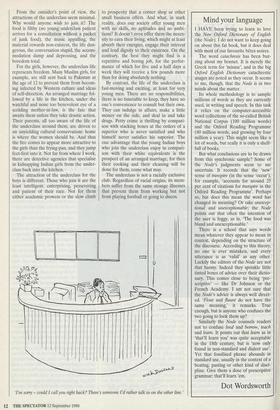Mind your language
I HAVE been trying to learn to love the New Oxford Dictionary of English (the Node). I do not want to keep going on about this fat book, but it does deal with most of our favourite bates noires.
The word catachresis has been buz- zing about my bonnet. It is merely the Greek term for 'misuse', and in the big Oxford English Dictionary catachrestic usages are noted as they occur. It seems to me, though, that the Node is in two minds about the matter.
Its whole methodology is to sample millions of words as they are currently used, in writing and speech. In this task it relies on the computer-accessible word collections of the so-called British National Corpus (100 million words) and the Oxford Reading Programme (40 million words, and growing by four million a year). This might seem like a lot of words, but really it is only a shelf- full of books.
But what conclusions are to be drawn from this synchronic sample? Some of the Node's judgments seem to me uncertain. It records that the 'new' sense of transpire (in the sense 'occur'), for example, 'accounts for around 25 per cent of citations for transpire in the Oxford Reading Programme'. Perhaps so, but does this mean the word has changed its meaning? Or take unexcep- tional and unexceptionable; the Node points out that often the intention of the user is foggy, as in, The food was bland and unexceptionable.'
There is a school that says words mean whatever they appear to mean in context, depending on the structure of the discourse. According to this theory, no one is ever mistaken, and every utterance is as 'valid' as any other. Luckily the editors of the Node are not that barmy. Indeed they sprinkle little tinted boxes of advice over their dictio- nary. This comes close to being 'pre- scriptive' — like Dr Johnson or the French Academy. I am not sure that the Node's advice is always well direct- ed. 'Flout and flaunt do not have the same meaning,' it remarks. True enough, but is anyone who confuses the two going to look them up?
Similarly the Node counsels readers not to confuse lend and borrow, teach and learn. It points out that learn as in 'that'll learn you' was quite acceptable in the 18th century, but is 'now only found in non-standard and dialect use'. Yet that fossilised phrase abounds in standard use, usually in the context of a beating, pasting or other kind of disci- pline. Give them a dose of prescriptive grammar; that'll learn 'em.
Dot Wordsworth


































































 Previous page
Previous page